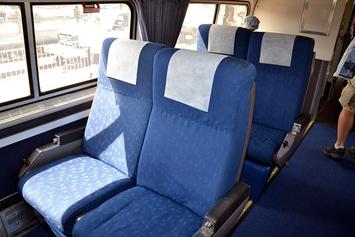
The Antiplanner isn’t alone in suggesting that hiring an airline executive to run Amtrak is a bad idea (at least for Amtrak). Last week, a former Amtrak official (who wishes to remain anonymous) sent a letter to Maryland Senator Chris Van Hollen asking that former Delta CEO Richard Anderson be fired from his current job as CEO of Amtrak. Alternatively, suggested the letter, Anderson should be constrained “taking actions which will jeopardize the
existence of the Amtrak system.”
The letter cites some of the examples mentioned in the Antiplanner post: downgrading of food services and elimination or reduction of special trains and private car moves. But it also notes that Anderson proposes to replace the electric-powered trains between Washington and Boston with diesel trains even though the diesel trains would be slower and cause pollution problems in tunnels into and through New York.
Even more significantly, former Amtrak CEO Joseph Boardman wrote a letter defending long-distance trains and specifically the Chicago-Los Angeles Southwest Chief. One of Anderson’s controversial policies is to demand that railroads install positive-train control by the end of this year. The train most threatened by this may be the Southwest Chief, as the Kansas-Colorado-New Mexico portion of that route that goes over Ratón Pass is on tracks that BNSF doesn’t even want to maintain for freight, much less spend hundreds of millions for passenger trains that it earns little profit from.
It is worth noting that many people believe that Joseph Boardman was Amtrak’s second-worst CEO, the first-worst being Amtrak’s first CEO, former airline executive Roger Lewis, who brought airline food and airline seats to Amtrak’s trains. Former Trains magazine (and current Railway Age) correspondent Don Phillips was scathing in his criticism of Boardman when he held the job. But now, says Phillips, Anderson has bumped Boardman to number three.
Boardman (and Phillips) ignore the fact that BNSF is perfectly willing to host the Southwest Chief on an alternate route through Amarillo, Texas. The alternate route misses Albuquerque by about 30 miles, but otherwise serves larger cities than the current route. A lot of the attachment to the current route is romantic, as Ratón Pass was the route of the fabled Santa Fe Super Chief. Advocates of this route have persuaded state and federal governments to spend hundreds of millions of dollars maintaining the tracks for a train that loses more than $50 million a year on operating costs.
For Boardman, the Southwest Chief is a test case: if Congress is willing to spend $35 billion or more rebuilding Amtrak’s tunnels under the Hudson River, then it should also be willing to spend the hundreds of millions needed to bring the Raton Pass route up to code. Yet the Raton Pass route probably carries only about 500 passengers a day, while the Hudson River tunnels move close to 500 trainloads of passengers per day. Of course, the Antiplanner thinks the Hudson River tunnels aren’t worthwhile either.
What Boardman, Phillips, and the anonymous letter writer understand — and maybe Anderson doesn’t — is that long-distance trains such as the Southwest Chief may be an insignificant speck on the nation’s transportation system, but play an important role in keeping Amtrak politically viable. These are political trains, pure and simple, existing solely so that a clear majority of senators and representatives will have an incentive to support federal subsidies to Amtrak.
All Amtrak trains lose money — a lot more money, per passenger mile, than highways, buses, or airlines. Amtrak covers this up in the Northeast Corridor by allowing a $50 billion maintenance backlog to build up and it covers up losses on state-supported trains by pretending that state subsidies to those trains are passenger revenues. But it doesn’t have any easy tricks to cover up losses of long-distance trains, so they get targeted when an airline executive takes over the company. While a more savvy CEO would recognize the political importance of those trains, an even more savvy CEO would pull the plug on all of the money-losing trains.
This piece first appeared on The Antiplanner.
Randal O’Toole is a senior fellow with the Cato Institute specializing in land use and transportation policy. He has written several books demonstrating the futility of government planning. Prior to working for Cato, he taught environmental economics at Yale, UC Berkeley, and Utah State University.
Photo: Walter from Tampa/St Petersburg, Florida (DSC_5253_pp) [CC BY 2.0], via Wikimedia Commons












